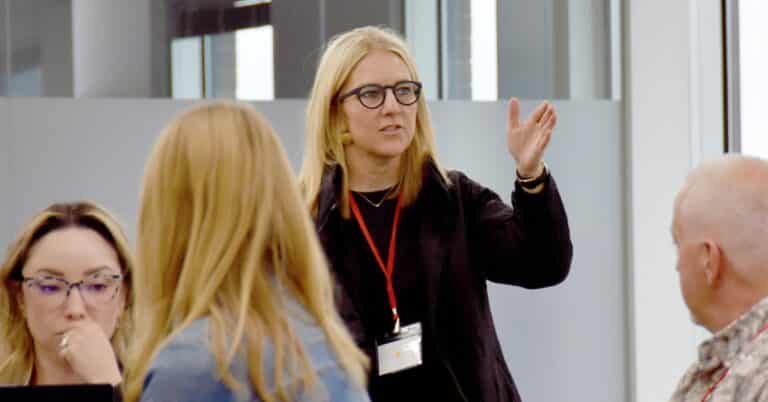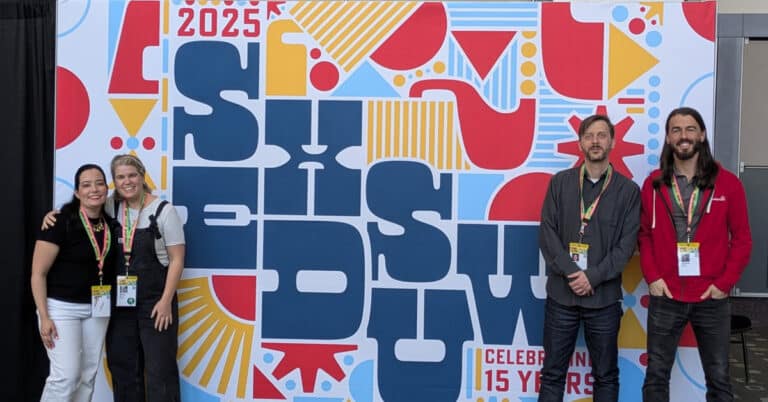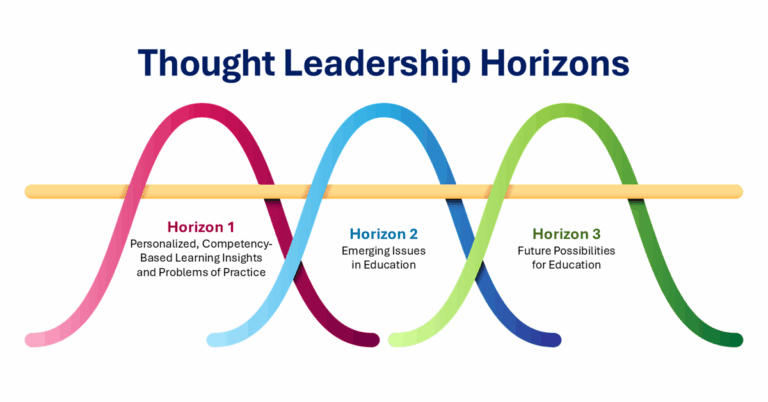We stand on a precipice. With so many of us now interacting directly with generative artificial intelligence (AI) and with thoughtful experimentation and hype afloat, we’re glimpsing a future in which AI could deeply change education – and people.
AI can personalize learning, but only teachers can humanize it.
Education leaders in the U.S. and around the world are working diligently and creatively to provide teachers and students with the support needed to discern when and how to use AI appropriately and safely. They are also calling to keep humanity at the center of education even as AI presents existential shifts.
This call for centering humanity in education resonated throughout UNESCO’s Digital Learning Week 2025, an international gathering of people committed to ensuring that technology serves as a force for inclusive progress. As Janeth Kigobe of The Open University of Tanzania put it, AI can personalize learning, but only teachers can humanize it.
Indeed, many education leaders are focusing on using AI to augment human connections and teachers’ work. For example, Stephen Morgan, Minister for Education, United Kingdom of Great Britain and Northern Ireland, highlighted his government’s focus on safety first, and then teacher efficacy. Fadhlina Sidek, Minister of Education, Malaysia, described her country’s efforts to support teachers in guiding the technology within guardrails for safety while also promoting equity through offline and low-bandwidth tools and the use of local languages.
What are the risks of AI in education?
The risks associated with AI are becoming familiar: bias, fallacies, privacy and ethical violations, cognitive atrophy, environmental degradation and the undermining of human relationships. There’s the potential for AI to be an isolating technology, especially when applied in educational settings. Compounding significant gaps in infrastructure and access within and across countries, there are large cultural relevance and language gaps with so many of the tools being developed by corporations based in just a few countries. Plus, AI relies on existing and historical data, so it looks backward, while education needs to look ahead.
AI relies on existing and historical data, so it looks backward, while education needs to look ahead.
So far, much use of AI in education has focused on augmenting or creating efficiencies within today’s education systems. Over the next decade, it could push further, affecting learning design and delivery, as well as the ways education is organized and how educational decisions are made.
Among many possibilities, KnowledgeWorks’ latest forecast on U.S. education futures describes the prospect of AI’s enabling dynamic learning flows that could tailor educational content, pacing, approaches and support to learners’ needs. But, as Corrin Varady of South Africa’s IDEA Group suggested during UNESCO’s Digital Learning Week, using AI in educational settings could conversely undermine efforts to personalize learning, flattening learning experiences and pushing them back toward one-size-fits-all approaches.
In either case, the use of AI in education could violate human and child rights. As enumerated by Wayne Homes of University College London and the International Research Centre of AI during the event, those include the right to privacy, the right to be heard, the right to a quality education and the right of a child not to be commercially exploited.
Furthermore, having access to human teachers could become a privilege. KnowledgeWorks’ forecast explores the possibility that resource constraints could lead more and more government-run schools to use adaptive learning modules and eventually also artificial general intelligence (AGI) teachers to fill curricular gaps and address teacher shortages.
What possibilities exist to better integrate AI in education?
In striving to keep humanity at the center of education, global education leaders have called for prioritizing instructional goals and then considering whether and how to integrate AI. What purposes of education we set will, as ever, be critical in guiding the use of AI as an instructional technology.
In addition, there are a variety of issues to watch as people explore ways to integrate AI in education. Among them, Andreas Schleicher of the Organisation for Economic Co-operation and Development cautioned that we need to watch for increases in student engagement that fail to correlate with learning gains. Dino Ballotti, Namibia’s Minister of Education, Youth, Sports, Arts and Culture, called for AI to be co-created with people in specific contexts so that it would meet their needs and keep knowledge locally situated. This notion was supported by Emily Bender of the University of Washington, who asserted that it’s impossible to separate knowledge from the communities in which it is situated. Isabelle Hau of Stanford Accelerator for Learning shared key tensions that education leaders will need to balance when designing for human flourishing.
Fundamentally, global education leaders see education as an essential common good and want it to remain so. As KnowledgeWorks’ forecast warns, it is not a given that education will remain a strong public good that is personalized, equitable and relevant to learners’ needs and interests. Stefania Giannini, UNESCO’s Assistant Director-General for Education, identified curriculum as being the most powerful catalyst for change in education because it functions as an architecture of learning. To help ensure that digital learning is a common good, the UNESCO-UNICEF Charter for Public Digital Learning and related “Gateways” initiative aim to address the need for high-quality, easily discoverable and usable digital learning content that exists beyond market logics.
We must keep the aperture open when considering AI in education.
During UNESCO’s Digital Learning Week, Báyò Akómoláfé described this time in human history as a liminal moment in which AI is disrupting our claims to independence and disclosing the harmful systems that we inhabit. He advised that people need to look beyond regulation and optimization, to follow the cracks as things shift, to experiment playfully as we grapple with AI.
From today’s vantage point, it can be easy to focus on the risks that AI presents for education and human development. Opinions vary as to whether integrating AI into educational settings is inevitable. No doubt there will be variations across place and circumstance. But with AI being on pace to become as general purpose as electricity or the internet, we might not have as much agency as we would like.
In examining and imagining how AI could change the ways humans think and feel and shift what happens in education, we need to activate multiple perspectives and time horizons. By surfacing a variety of possible futures, we can bring different destinations into focus and consider their potential impacts. We can return from that expedition prepared to chart new courses for education that reflect our deepest desires and highest values, along with awareness of how AI and other drivers of change could impact education and shape what learners need.
Though we can see some of the impacts of AI now, we must keep looking ahead and considering possibilities. Now is the time for education leaders to cultivate AI literacy among their staff and students, to consider what kinds of educational experiences and learning targets to prioritize and to innovate what it means to provide education as a public good. Otherwise, we might find that public education has fallen sway to increasingly prevalent market forces.






